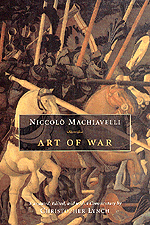
"Christopher Lynch has made the best and the first careful translation of Machiavelli's Art of War. With useful notes, an excellent introduction, an interpretive essay, glossary, and index, it is a treasure for readers of military history and Renaissance thought as well as for lovers of Machiavelli."—Harvey Mansfield, Harvard University
"Christopher Lynch's new translation of Machiavelli's Art of War is a much-needed corrective to existing translations and to the less than rigorous analysis of this historically important text by previous commentators. It has the potential of becoming the standard English version of an important historical document."—Carnes Lord, Naval War College
Aphorisms from
Art of War
by Niccolò Machiavelli
• A battle that you win cancels any other bad action of yours. In the same way, by losing one, all the good things worked by you before become vain.
• Since the handling of arms is a beautiful spectacle, it is delightful to young men.
• Knowing how to fight made men more bold, because no one fears doing what it seems to him he has learned to do. Therefore, the ancients wanted their citizens to be trained in every warlike action.
• When they remain in garrison, soldiers are maintained with fear and punishment; when they are then led to war, with hope and reward.
• Without doubt, ferocious and disordered men are much weaker than timid and ordered ones. For order chases fear from men and disorder lessens ferocity.
• Never lead your soldiers to battle if you have not first confirmed their spirit and known them to be without fear and ordered; and never test them except when you see that they hope to win.
• Every little advantage is of great moment when men have to come to blows.
• To know in war how to recognize an opportunity and seize it is better than anything else.
• In the armies, and among every ten men, there must be one of more life, of more heart, or at least of more authority, who with his spirit, with his words, and with his example keeps the others firm and disposed to fight.
• In war, discipline can do more than fury.
• Sometimes it has been of great moment while the fight is going on, to disseminate words that pronounce the enemies' captain to be dead, or to have been conquered by another part of the army. Many times this has given victory to him who used it.
• It is much better to tempt fortune where it can favor you than to see your certain ruin by not tempting it.
• There is nothing as likely to succeed as what the enemy believes you cannot attempt.
• The greatest remedy that is used against a plan of the enemy is to do voluntarily what he plans that you do by force.
• You must never believe that the enemy does not know how to conduct his own affairs. Indeed, if you want to be deceived less and want to bear less danger, the more the enemy is weak or the less the enemy is cautious, so much more must you esteem him.
• The forces of adversaries are more diminished by the loss of those who flee than of those who are killed.
• And above all you ought to guard against leading an army to fight which is afraid or which is not confident of victory. For the greatest sign of an impending loss is when one does not believe one can win.
• Necessities can be many, but the one that is stronger is that which constrains you to win or to die.
• Present wars impoverish the lords that win as much as those that lose.
• War makes thieves, and peace hangs them.
Copyright notice: Adapted from Art of War by Niccolò Machiavelli, published by the University of Chicago Press. ©2003 by the University of Chicago. All rights reserved. This text may be used and shared in accordance with the fair-use provisions of U.S. copyright law, and it may be archived and redistributed in electronic form, provided that this entire notice, including copyright information, is carried and provided that the University of Chicago Press is notified and no fee is charged for access. Archiving, redistribution, or republication of this text on other terms, in any medium, requires the consent of the University of Chicago Press.
Niccolò Machiavelli
Art of War
Translated, Edited, and with a Commentary by Christopher Lynch
©2003, 312 pages, 2 maps, 7 line drawings.
Cloth $25.00 ISBN: 0-226-50040-3
Paper $16.00 ISBN: 0-226-50046-2
For information on purchasing the book—from bookstores or here online—please go to the webpage for Art of War.
See also:
- Our catalog of politcs and political science titles
- Our catalog of history titles
- Our catalog of medieval and renaissance studies titles
- Other excerpts and online essays from University of Chicago Press titles
- Sign up for e-mail notification of new books in this and other subjects